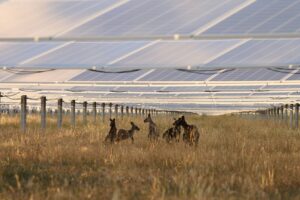Federal Coalition MPs have called on the Morrison government to lift the ban on nuclear energy and pave the way for “emerging” nuclear technologies to be introduced into Australia’s energy mix, despite their enormous expense, huge environmental risks, and as-yet unproven technical status.
The controversial push comes with the tabling of a 230-page report on Friday, the result of the inquiry into nuclear power called by energy and emissions reduction minister, and ex anti-wind campaigner Angus Taylor.
It was conducted by the Liberal dominated House Standing Committee on the Environment and Energy and chaired by pro-nuclear MP Ted O’Brien. See also: Federal nuclear inquiry report: Loopy lunatics in charge of the asylum
The finding from the Coalition MPs is unsurprising, but it should be noted that it goes against the advice from some of Australia’s foremost energy market authorities, including the Australian Energy Market Operator, who – as part of an expert panel including representatives from the market regulator (AER) and rule maker (AEMC) – told the inquiry that nuclear power just didn’t stack up against firmed renewables.
The nuclear report – entitled Not without your approval – was unveiled by O’Brien on Friday, who said it was “informed” by months of evidence-taking and the assessment of over 300 submissions on the prerequisites for nuclear energy in Australia.
In a statement released with the report, O’Brien urged Australians to “say a definite ‘No’ to old nuclear technologies but a conditional ‘Yes’ to what he called new and emerging technologies such as “small modular reactors,” which the inquiry was told by nearly all experts would not be commercially available for at least a decade.
But the Coalition report largely skated over the costs, and the delays in new technologies, and the projections from AEMO that Australia’s grid could reach 90 per cent renewables by the time that nuclear could be built in Australia, and instead relied on the highly contestable submissions from a group of nuclear proponents and ginger groups.
The focus on small modular reactors, or SMRs, is in line with the advice to the Committee from Ziggy Switkowski, who headed up the Coalition’s last nuclear thought bubble.
In fact, Switkowski told the Committee that the only hope for nuclear in Australia hinged on the future of Small Modular Reactors – which, as Jim Green explains here, are currently “non-existent, overhyped, and obscenely expensive.” The CSIRO and the AEMO agree – at least on the expensive bit.
O’Brien appears to have taken Switkowski’s advice and spun it into something resembling action on climate change, which is a new angle for the federal Coalition.
“If we’re serious about reducing greenhouse gas emissions, we can’t simply ignore this zero-emissions baseload technology,” he said, ignoring AEMO’s and other advice about the potential of emission cuts from renewables, something backed up by the latest government report.
“But we also need to be humble enough to learn lessons from other countries who have gone down this path. It’s as much about getting the technology right as it is about maintaining a social license based on trust and transparency.” No mention of the massive cost blowouts and delays in every other western country that has tried to build new nuclear.
O’Brien also said “the Australian people should be at the centre of any approval process,” a reference to a separate and possibly self-defeating recommendation of the report, that the partial-lift of the moratorium be subject to a commitment to community consent as a condition of approval for any nuclear power or nuclear waste disposal facility.
The federal opposition has slammed O’Brien’s recommendation, which it says has been made “despite clear evidence nuclear power is enormously expensive, slow, inflexible, and dangerous to the environment and human health.”
The Committee’s deputy chair, ALP MP Josh Wilson, said O’Brien’s view was not supported by Labor – which has argued in a dissenting report that the pursuit of nuclear power is “madness.”
“The report, supported by the Coalition members of the Committee, is unbalanced and ignores the clear evidence provided by a series of expert witnesses, including key government agencies,” Wilson said.
“The Chair’s report is not supported by Labor and our dissenting report shows that on any measure – cost, timing, energy needs, waste, environmental & health risks, and non-proliferation – the pursuit of nuclear power is madness.”
Mark Butler, federal Labor’s shadow climate and energy minister said the entire inquiry was “nothing but an indulgence” for a party that would “rather fantasise about nuclear energy than come up with a credible national energy policy.
“As a result of this Government’s energy paralysis, Australian households and businesses are paying far higher power prices and renewable energy investment has been cut by over 60 per cent this year,” Butler said.
Green groups are not impressed, either. The Australian Conservation Foundation said on Friday that it strongly believed Australia’s “long standing and prudent prohibition on nuclear energy” should remain in place.
“From the heartland to the harbour, the terrible drought and bushfires we are experiencing leave no doubt that Australia must quickly transition away from climate-wrecking fuels like coal, oil and gas,” said the ACF’s Nuclear Free Campaigner, Dave Sweeney.
“The Australian Energy Market Operator’s roadmap for the efficient development of the National Electricity Market makes it clear that Australia’s energy transition is heading towards small and large-scale renewables.
“Australia’s long standing, sensible moratorium on nuclear energy, enacted by John Howard, does not preclude discussion or debate on nuclear. There has been plenty of both.
“But while no commercial operator will touch nuclear, the moratorium remains important as it prevents a reckless government pouring public money into this economically and environmentally risky industry.”





